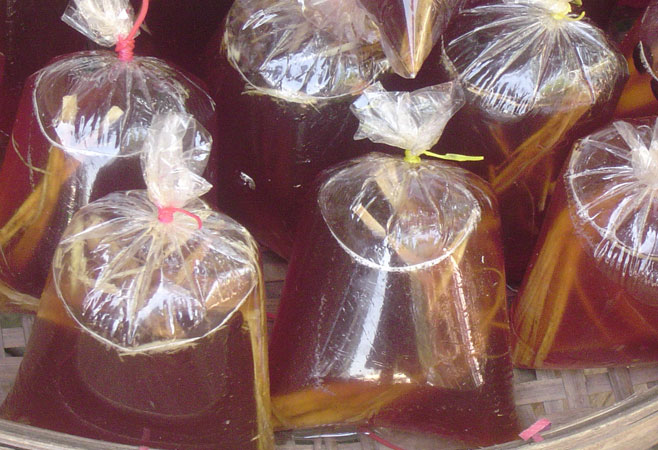Culture
Myanmar Shampoo
- Details
- Hits: 6105
 Myanmar Shampoo
Myanmar Shampoo
Home-Made Myanmar Shampoo
There was a time, not long ago when long, black glossy hair was considered the crowning glory of a Myanmar woman and the longer and thicker the growth, the better. In fact, men also wore their hair long and knotted in the days of the monarchy and even after. Short hair was considered unbecoming and indecorous especially in women. Even small girls used to wear their hair long in a small topknot encircled by a fringe.
This style was called a "‘Hsayit-waing". When a girl entered adolescence the hair has grown longer and the topknot thicker, but she still has a fringe with the side ends tucked in a curve behind the ears. This is called a "Hsadauk" and both styles are sweet and charming. When an adolescent girl reaches womanhood the fringe now grown longer is gathered up together with the hair of the topknot, and these long tresses are twined into a chignon. These differing hairstyles mark the progress of the years through childhood and adolescence to womanhood. But the hair was always worn long. Long hair has come back into fashion but now it is worn hanging down like a veil at the back. This style, by the way, was taboo in the olden days.
Formerly women wore their hair long but it was always fashioned as a "Sadone", a cylindrical topknot with or without tresses flowing down the side. Or else it was twisted and wrapped around a comb, usually made of bamboo, ivory or tortoise shell, or tied into a bun at the nape of the neck.
Long hair however called for neatness and cleanliness. A Myanmar woman never used to allow herself to be seen with hair tousled or tangled. Her hair was always oiled with pure fragrant coconut oil and knotted in place. Cleanliness required at least a weekly shampoo and twice weekly in the summer. And there was a very effective fresh, natural shampoo that was always home made.
The main ingredients of this shampoo consist of the bark of a shrub known as"Tayaw". (Family Name: Sterarliaceae; Botanical Name: Buettneria Adamnensis,Kz) Then there is the soapy fruit of the "Kin-mun". (Family Name: Mimosaceae; Botanical Name: Acacia Concinna, Dc.) The distribution of both plants is countrywide and they grow in the wild and thrive without tending. The shampoo is prepared in a quantity sufficient for all the females of the household, young and old. Both the bark of the Tayaw and the fruit of the Kin-mun is easily available at any bazaar year round.
The Kin-mun fruit is first washed thoroughly and boiled with water until soft and pulpy. While the Kin-mun is being boiled the Tayaw is shredded, washed and soaked in a bowl of cold water. Very soon the water becomes a thick viscous liquid. The amount of water used must be of equal parts for both. When the boiled Kin-mun water has cooled, it is passed through a sieve and the pulp removed. The same is done for the Tayaw though it is difficult to get rid of all the fibres. Both liquids are then mixed together and we have a shampoo with a faint elusive scent. Sometimes one or two limes are halved and soaked together with the Tayaw but this is optional.
To use this shampoo, one sluices the hair with water first. Then with a small cup or bowl the liquid shampoo is poured generously on the head and the scalp is scrubbed and massaged. Scrubbing produces some suds from the Kin-mun, but not much. This is done at least twice, after which the long hair is shampooed and scrubbed in manageable proportions until one reaches the tip. After this, many bowls of water are poured to wash away the Tayaw and Kin-mun and the hair is now squeaky clean. The soapy Kin-mun cleanses the hair, the lime prevents or cures dandruff and the Tayaw is the best natural hair conditioner making the hair soft and pliant and therefore easy to comb.
Tayaw/Kin-mun shampoo is still used by Myanmar women today, but in the cities where the pace of daily life has quickened, this shampoo is sold ready made in two plastic bags, one containing Tayaw and the other Kin-mun. The lime is added at home if so desired. But imported foreign shampoo and conditioners are fast replacing the traditional natural home- made shampoo.
Some enterprising Myanmar businessmen with the help of chemists, seeing the economic potential of Tayaw and Kin-mun which are cheap and plentiful, have begun manufacturing local shampoos with a Tayaw/Kin-mun base. It is made in both liquid and powder form, but I doubt if the purity of the home-made shampoo has been retained.




